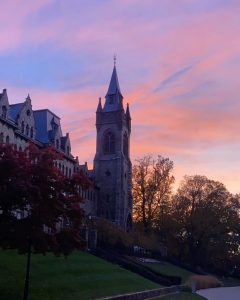Is Seasonal Happiness Prevalent in BCA?
October 13, 2022
One of the most well-known psychological phenomena is Seasonal Affective Disorder (SAD), which induces emotions of depression within certain seasons due to climate and sunlight differences between them. In the general public, with the inclusion of Bergen County Academies, emotional status can be attributed to the seasons, albeit to a lesser extent. According to a survey about seasonal happiness, a slight majority of the BCA community believes that happiness is related to the seasons.
This survey shows that 62.4% of the students at Bergen County Academies feel like their happiness is related to their seasons. As for the lesser minority, about 13.7% believe that the seasons do not impact their emotions, while 23.9% of the students are uncertain about the connection between both concepts.
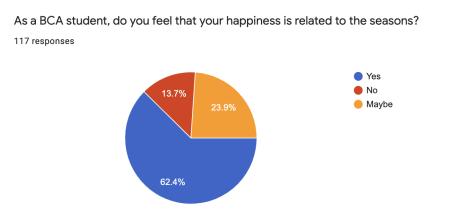
According to the same survey, most BCA students believe that the seasons do have a definite impact on their school life, with 4.3% believing that it has a huge impact on the students, 42.6% of the respondents believing that the seasons have a noticeable impact, 35.7% of the students believing that the seasons have little impact, 17.4% believing that the seasons have no impact. While this does prove that the seasons have an impact on emotion, there seems to be a larger factor in play.
Respondents who feel a connection between season and happiness were asked what seasons made them the happiest, and how seasonal transitions either increase/decrease their happiness.
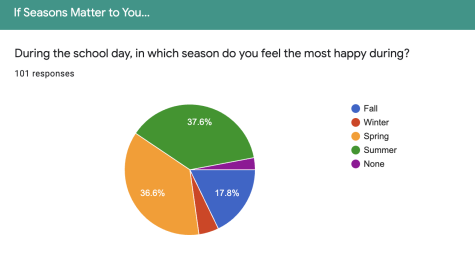
Most students think that spring and summer makes them the happiest, with a nearly equal percentage of students voting for each of the two seasons. Based on how happiness is increased in SAD patients, it makes sense that seasons with more sunlight would elicit more happiness, as people tend to gravitate towards seasons with higher amounts of sunlight.
Nathan Srivatsa, an AAST freshman, agrees that sunlight is the major factor contributing to his belief that spring is the season that makes him the happiest. Additionally, he adds that the lack of sunlight in other seasons, “also limits my ability to do certain activities during these seasons because it’s too dark to do anything outside,”. AVPA-M freshman Danielle Adcock agrees that the weather affects her happiness due to her inability or ability to do certain outdoor activities, despite her overall enjoyment of all seasons. She states, “To some extent I like all seasons; if I were to pick a favorite, I would pick spring or summer because when I am not doing music stuff, I like going out… Just before this I went out to play with my dog, and in the colder months, I tend to not do that too much.”
However, this is not the case for every BCA student. Another student states that their happiness is related to the circumstances that surround a particular season, as opposed to the amount of sunlight. Specifically, this student states that they like summer because there is, “no school.” Additional data shows that 73% of respondents believe the work during specific trimesters is the major reason why students are either happy or sad during seasons.
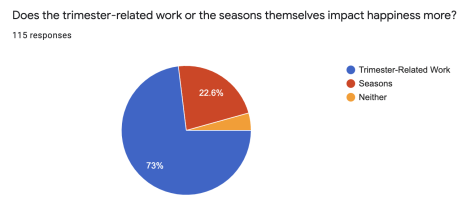
Danielle also believes that school matters are more important. In her case, she believes that grades are the main concern over the seasons: “I don’t focus on how the seasons will begin or end while I am doing my schoolwork. Usually, I am focused on getting my work done and then focused on the weekend because I could take a break from those long 5 days of school,” she states.
It seems that happiness seems to be connected to both schoolwork and the seasonal climate, which can be seen within the winter season. The survey states that 74.3% of students believe that winter brings them the most sadness.
These relationships are further solidified by data regarding changes in happiness between seasons. Between winter and spring and between spring and summer respectively, 56.4% and 60.4% of the student body believes their happiness increases. However, 75.2% of the student body believes that the transition between fall and winter causes a decrease in happiness, which reflects the previous data.
Two out of the three students interviewed agree with this statement. However, Danielle disagrees since she has no preferred season. This is because she considers time within BCA to be more focused on trimesters rather than seasons. “…Those grades that you see on the report card go by trimester instead of Season, so I focus on the trimester time period instead,” she states.
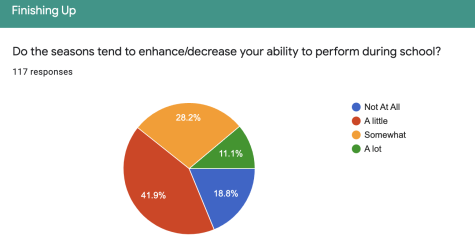
According to the survey, students believe the seasons only affect their school life slightly. 41.9% of BCA students believe that only a small portion of our school performance is dependent on the seasons, while 28.2% believe it is prevalent to a medium extent. While academics do take precedence, the seasons also impact the happiness of students in and out of school due to a general preference for daylight and the longer hours available for outdoor activities.


